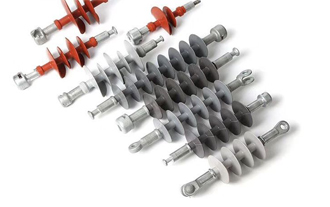The Development Trend And Technical Analysis Of Silicone Rubber Insulators
Beginning in the second half of the nineteenth century, when erecting transmission lines, the only insulating materials suitable for high voltages were ceramics and glass. In the 1940s, due to the advent of polymer materials, ceramics and glass were no longer the preferred insulator materials. European and American countries began to study polymer insulators. Afterward, the physical properties, electrical properties, long-term reliability, and optimal shape of electrical insulators were studied, and the productivity has been continuously improved.
Among polymer materials that can replace ceramics and glass, silicone rubber has had practical performance since the 1960s and has stood out among several polymers. Silicone rubber insulator has more advantages than ceramic insulators. First of all, it is lightweight, easy to operate, and safe; in addition, ceramic insulators often suffer from cracking, and it will be damaged by an impact. Silicone rubber insulators can resist mechanical shocks such as vehicles colliding with utility poles.
Although other polymer materials also have the advantages described above, only silicone rubber will not cause too much pollution to the environment. The polymer insulator is waterproof, so there will be no leakage and surface arcing caused by the falling of water droplets. The water-resistance of China Silicon Rubber Insulator recovers faster than other polymer insulators, and it is a durable material that can be used for a long time in harsh environments.
There are characteristics of silicone rubber. Silicone rubber has the following characteristics, it can be used for high-voltage electrical insulation occasions.
(1)Heat and cold resistance
Due to the high bond energy and chemical stability of silicone rubber, its heat resistance is better than that of organic polymers. Furthermore, since the intermolecular interaction force is weak, the glass transition temperature is low and the cold resistance is good. Therefore, its characteristics will not change when used in any area on the earth.
(2)Water resistance
Since the surface of polysiloxane is a methyl group, it is hydrophobic and can be used for waterproofing.
(3)Electrical performance
The number of carbon atoms in the silicone rubber molecule is less than that of organic polymers, so its arc resistance and leakage resistance are very good. In addition, even if burned, insulating silicon is formed, so it has excellent electrical insulation.

(4)Weather resistance
Since siloxane bond energy is greater than ultraviolet energy, it is not easy to cause aging due to ultraviolet light. In the accelerated aging test of ozone resistance, the organic polymer will crack due to aging in a few seconds to a few hours, while the strength of the silicone rubber only decreases slightly after aging for 4 weeks, and no cracks occur. The ozone resistance is good. Acid rain is an ionic mixture with a pH of about 5.6. In the artificial acid rain test (500 times), silicone rubber has excellent chemical resistance, although it may have different changes when it is placed in a mixture such as acid rain. , But I’m afraid it will have little effect.
We are Silicon Rubber Insulator suppliers. Please feel free to contact us.
+86 319 878 9350
+86 156 1304 7999
+86 319 878 9350
NanYan, DongHuan Road, Shahe, Hebei China
Copyright © Hebei Yipeng Line Equipment Co., Ltd. All Rights Reserved. | Sitemap Powered By 
